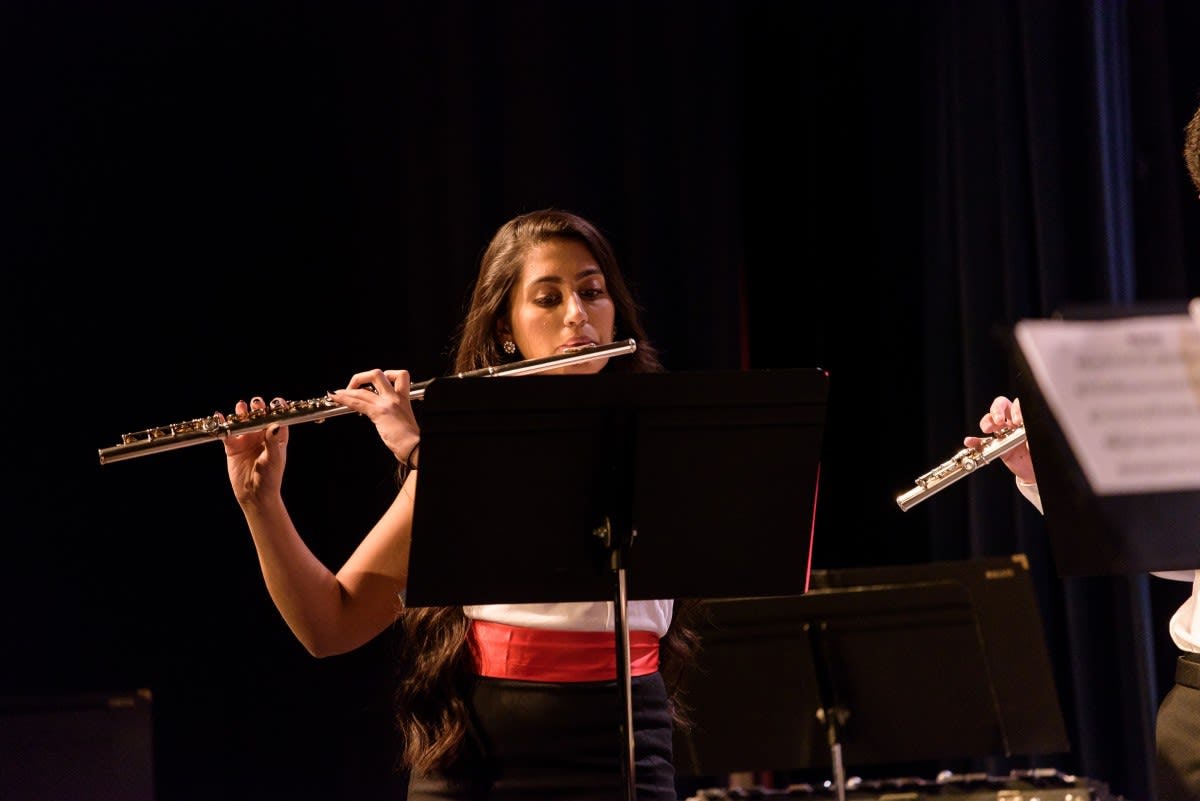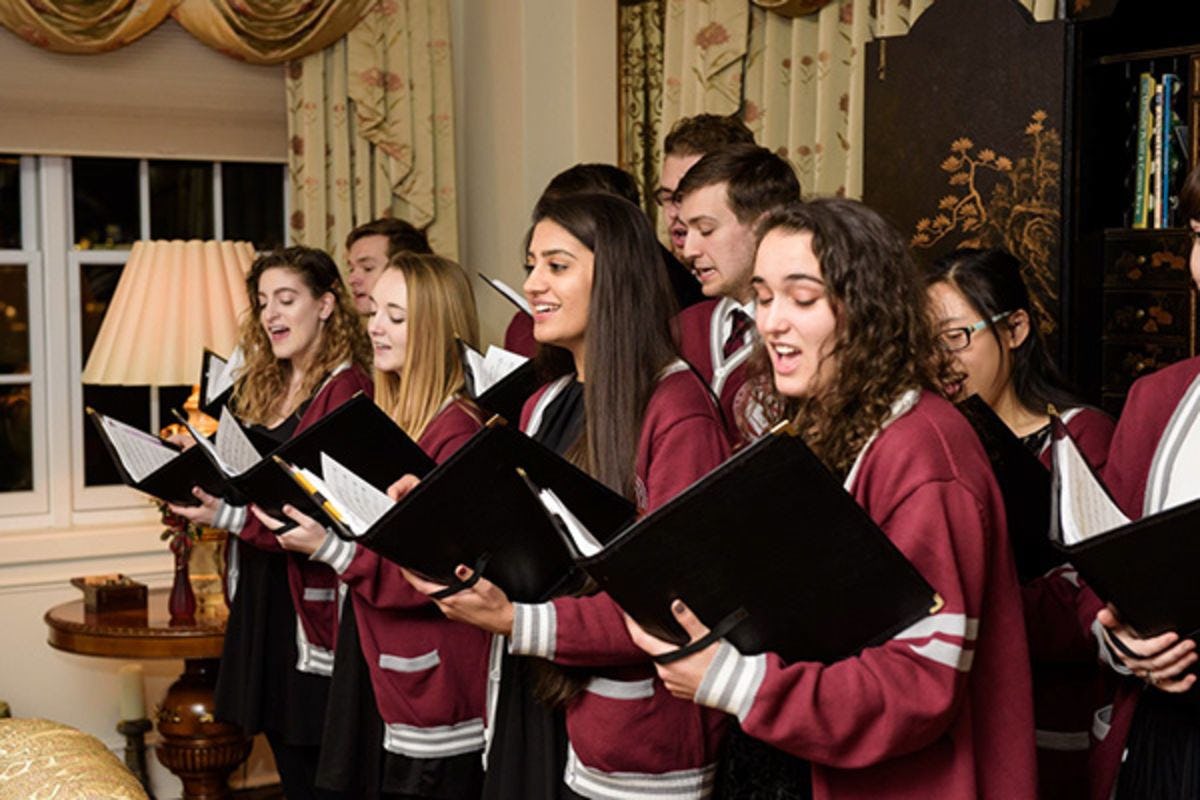Stevens Senior Will Pursue Master's in Innovation Design Engineering at the Royal College of Art and Imperial College London
Music and computer science talent Moenika Chowdhury will pursue new innovations in the UK
As recently as two months ago, graduating senior Moenika Chowdhury, a music and technology major at Stevens Institute of Technology, was set to make the short trip across the Hudson River to pursue graduate studies in interactive digital media in New York City.
Then, about six weeks ago, a new opportunity came in the form of an acceptance letter into the Innovation Design Engineering (IDE) program, a joint program that leads to the award of a master’s of art from the Royal College of Art and a master’s of science from Imperial College London.
The prestige of that program and its focus on leading-edge creative product development, one that involves experimentation, design, engineering and enterprise activities, forced Chowdhury to reexamine her carefully-thought out plans.
“I want to create music products that would enhance how somebody experiences music, and I feel that the program’s emphasis on product development will help me to eventually start my own company where I could do that,” she explains.
Chowdhury still plans to begin her career in New York, but the opportunity to live and study in London proved irresistible. No stranger to London, she had previously experienced that cosmopolitan city and its vibrant arts scene when she studied abroad there the summer after her sophomore year.
But the decision to go overseas was still difficult for the Fanwood, New Jersey native, since it meant moving across the Atlantic, far from her family.
Chowdhury’s parents, both accomplished musicians, cultivated in their daughter a passion for music at an early age. Her mother was trained in opera performance, and her father, a classical pianist turned electrical engineer, comes from a family steeped in India’s music industry. Chowdhury’s grandfather, Salil Chowdhury, was a world renowned film composer for Bengali, Hindi and Malayalam films.
Trained as a classical musician, Chowdhury began playing piano at the age of three and the flute at eight. She still plays the flute in her spare time, and as a member of the Stevens Orchestra and Band.
Immersion into AI research, building a standout portfolio
Her background in classical music caught the attention of Kelland Thomas, dean of the College of Arts and Letters (CAL) at Stevens. He hand-picked Chowdhury to assist him with ongoing research in developing a machine-learning program that could generate musical compostions in the style of Johann Sebastian Bach’s chorales.
“It was a hefty project that involved analyzing Bach’s first 50 chorales, and then creating a data set that could be fed into a computer so that the computer could create chorales in the style of Bach,” she explains.
“I was happy to work with Dean Thomas, who is also a classical musician (saxophone). He knew that my familiarity with classical music would help me to discern the accuracy of the automated music generator.”
The research project is just one among a number of varied learning experiences at Stevens that helped Chowdhury come into her own as a creative artist. In fact, the strong reputation of the university's music and technology program was what first drew Chowdhury to Stevens.
“You come into the program as a musician, in my case as a classical flutist, and you learn production skills that enable you to make your own music,” she says.
Students accumulate impressive portfolios that showcase a body of work stemming from all their coursework, she adds—another advantage of CAL programs.
“My portfolio encapsulates everything that I’ve worked on throughout my time here at Stevens – all my music and design elements. It’s the reason why I got admitted into the graduate programs that I did — admissions committees want to see what you’re capable of creating. During the interviews, I had to walk them through my portfolios and talk about all the things that I had created and built.”
One project that was particularly challenging but rewarding emerged from a sound design class in which Chowdhury was tasked with recreating — from scratch — the audio, music and sound effects of a seven-minute movie scene: a scene from the Hollywood film, The Martian.
“I had to create every sound effect, every movement Matt Damon's character made. I spent hours on it, for weeks, using random objects in my house, and put in the music last. It was probably my most difficult project, but it turned out great.”
Campus activities, faculty support, gaining confidence as an artist
In addition to her classroom projects, Chowdhury gained meaningful work experiences through internships at CNBC Digital and Nokia Bell Labs, where she continues to work, performing spatial audio research.
Both opportunities tapped into her proficient coding skills. A computer science minor, Chowdhury was introduced to coding by her older brother. At Stevens, she shared that talent by teaching children to code at the Boys and Girls Club in Hoboken. She also founded a computer science club on campus, serving as its president during her junior year.
She has also been active on campus in other ways – as a peer mentor, a global ambassador, a founding member of Alpha Phi, and a member of the President’s Ensemble.
Juggling campus activities while having to make a life-changing decision made the final month of her Stevens career “tough,” Chowdhury admits. But as she looks ahead to life after Stevens, she views graduation not as the end of her Stevens experience but a “stepping stone” to a new opportunity.
“I know from my own experience that professors here provide guidance beyond the classroom, whether it was helping me get an internship or discover what I wanted to do with my education. The opportunities that I had through Stevens definitely helped me to gain confidence in my creativity and ability to build things that could actually impact or influence people in a positive way, which is ultimately what I want to do,” she concludes.




